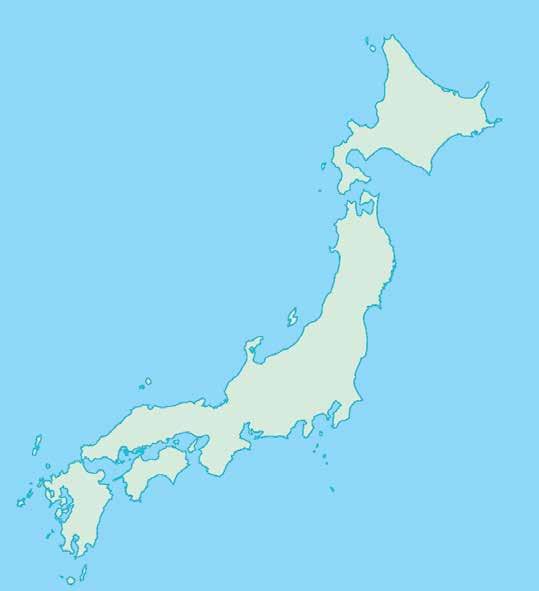
3 minute read
Japan
Central Japan is a region of tall mountain ranges and fast-flowing rivers. It wasn’t until recently that roads reached the more remote villages, and today many remain remarkably well-preserved, and evocative of centuries past. Our journey takes us through Japanese history, from modern Tokyo, to end near Kyoto, Japan’s capital for 400 years and the repository of much of the country’s cultural heritage. From Tokyo we head first to Fuji Hakone National Park, gateway to Mt Fuji. We visit Yudanaka Onsen hot spring where the famous ‘snow monkeys’ come to enjoy the natural hot spring baths, just like humans. In feudal times people travelling from Kyoto to Tokyo would use the Nakasendo Way – the road through the central mountains – one of a network of ancient highways. We will visit one of the best preserved sections in the Kiso valley, where the lovely villages of Tsumago and Magome have been immaculately restored. We then continue on to Takayama with its delightfully historic Sanmachisuji district, and lively morning markets. Our travels bring us to the UNESCO World Heritage Site of Shirakawago, before continuing on to Kanazawa, a vibrant city that retains its traditional charm in the form of gardens, samurai districts, and old teahouses. We continue on to Kyoto and Nara – the cultural heartlands of Japan and World Heritage Sites. We travel by bullet train once again to the modern city of Hiroshima, to learn about the city and its both tragic and triumphant history in the modern age. We return to Osaka to visit the city before we enjoy the special opportunity to stay at a shukubo, or Buddhist pilgrim’s lodgings, and enjoy an up-close experience of life in a Buddhist temple and discover the ancient capitals of Japan before a tour of modern Osaka.
Activity Level: 2/3
Fact File • 20 land days • Starts in Tokyo, finishes in Osaka • All meals included • Maximum 16 travellers Highlights • Witness the snow monkeys of Jigokudani • Visit restored lovely villages of Tsumago and Magome • Enjoy Kyoto and Nara – the cultural heartlands of Japan • Visit Kanazawa with its charming gardens, samurai districts and old teahouses • Learn about the tragedy & triumph of Hiroshima • Experience Japan’s bullet trains • Overnight in Buddhist pilgrim’s lodgings & enjoy an up-close experience of life in a Buddhist temple



Daily Itinerary Day 1: Arrive in Tokyo, kanazawa yudanaka onsen Welcome Dinner takayama Day 2: Tokyo Sightseeing narai tokyo Day 3: Exploring the Hakone Area and Mt. Fuji himeji hiroshima osaka kyoto nara mt. koya tsumago hakone Day 4: Yudanaka Hot Spring and Snow Monkeys of japan Jigokudani Day 5: Matsumoto Castle & Day 15: Sightseeing of Miyajima and Narai Post Town Onward to Hiroshima Day 6: Tsumago & Magome: Day 16: Hiroshima to Nara Day 7: Travel to Takayama Day 17: Todai-ji Temple and Nara Park Day 8: Takayama’s Sanmachisuji and Day 18: Mount Koya Heritage Sites Day 19: Morning Prayers (Optional) and Day 9: Shirakawa-go Travel to Osaka Day 10: Kanazawa: Sake Brewery, Day 20: Depart Osaka Samurai District, Higashichaya and Kazue Machi Districts Departure Dates & Prices Day 11: Morning Visit to Kenrokuen Sep 25 - Oct 14, 2021 - $9995 USD Garden and Onward Travel to Kyoto Accommodations Day 12: Sightseeing of Kyoto and Tea Ceremony Day 13: Kyoto - Golden Pavillion, Ryoanji and Teramachi/Nishiki Market areas Day 14: Travel to Himeji, Visit Himeji Accommodations are a mix of hotels (13 nights), traditional Japanese style inns (5 nights) with futons and possible shared bathrooms, and 1 night at a Pilgrim’s lodge attached to a Buddhist temple with shared Castle facilities. Staying at traditional style Japanese accommodations give us an authentic travel experience. Note: due to the unique accommo dations, single travellers (including those paying the single supplement) may need to share with same-sex singles for up to 6 nights). Japan has an excellent public transportation system which we will mainly be traveling on. This will involve lots of walking to and around large train stations, often carrying a day pack containing overnight clothes on luggage for warding days (approx 6 times). This is considered a walking tour.










